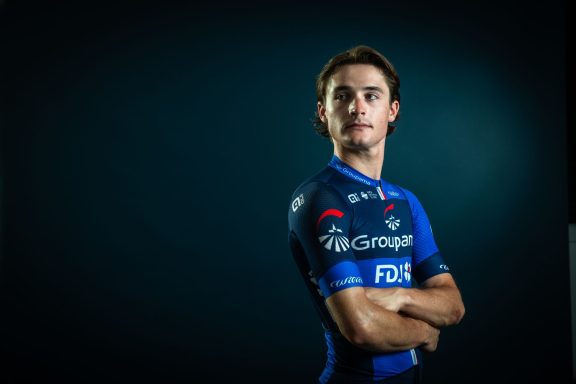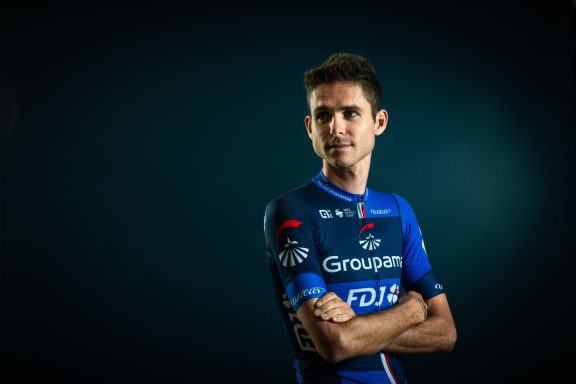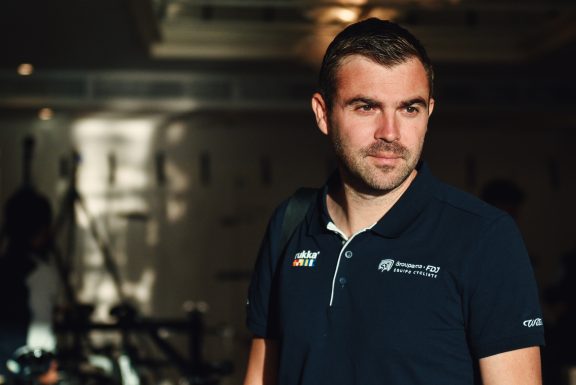Following a restructuring of the Groupama-FDJ cycling team this winter, the performance department as such disappeared. However, now a director of performance and innovation, Fred Grappe promises that the vision and philosophy remain within the structure and take even more space.
Fred, the team restructured over the winter, particularly from a “performance” point of view. Can you tell us how?
For several months I had been talking about “dissolving” the performance department, which was in line with the team restructuring. I no longer saw the point of locking performance into one department. It went very well for several years, but I realized that it was no longer very logical, as performance is globalized across the entire team. The performance department no longer exists, but I remain responsible for performance, and now to innovation as well. Above all, I’m getting a larger overview. I also wanted there to be a manager of coaches, Julien [Pinot], and I will rely on him. I will also rely on the sports manager, Philippe [Mauduit], on Jacky [Maillot] for health, on research and development, on the data scientist, on communication, etc. I am much freer now, because I am no longer responsible for the coaches, and that gives me more margin, more opening.
“I am connected to everyone, depending on the projects”
What will change in the work process?
We opened up everything! As director of performance and innovation, I can work directly with the managers of each department, and even with the riders on certain projects. I am connected to everyone, depending on the projects. The goal is to carry out development and performance projects that concern the entire team, from equipment to people. I will spend a lot more time and will be much more effective in managing performance missions within the team, knowing that my hands are quite free. My role will be to present projects to my colleagues, build them, discuss them, validate them, then implement them. Alone, I can’t do anything. I am only effective on a project if I have resources, which I will find among my colleagues, and that can concern a lot of people. The other very important point is being open to the outside. I spend a lot of time studying what is happening outside the team. If you’re too focused on what happens within the team, you can no longer see the big picture and you can’t work on performance. It’s fundamental. I was already doing it, but I will do it even more. This means involving external experts and observing what is happening in other teams, and especially in other sports. This is how I see performance. With the coaches, nothing is changing, except that Julien, who will be responsible for the group of coaches, will have more time than I had until then. The mission is tighter, and it will be more effective.
What will be your main missions from now on?
I have already launched a few programs. We’re already into it, we’re building and producing them. One of the main areas we’ll work on in 2024 concerns a lot of people: riders in the first place, but also coaches, sports directors and staff in general. This is a program that aims to push riders to the top: if we want to make them better tomorrow, we have to challenge them. They need this. It seems simple like that, but we are working on it, and something will fall into place. A top athlete needs to be challenged. This is already more or less what we do, but to make them even better, we can be even more efficient regarding the expectations we have of them. This results from work between coaches and sports directors to reach the maximum physical potential of our athletes. The other program is rather linked to the Tour de France, which is obviously a very important race for us. We are going to launch quite an innovative program. Besides that, it is of course still very important for us to continue working and developing the equipment.
“All the expertise put together makes a big expertise”
Does the evolution of your position mean the team wants to further emphasize R&D?
Above all, this means that we have understood, but we have actually known it for a while, that implementing performance and innovation across the entire team is something important that will only develop in the upcoming years. We could have taken slightly different paths during the restructuring, but for us, it is clear that having this vision is really important. From this point of view, we will rely even more on R&D and on the data scientist. These are essential areas nowadays. We will still have to go further from the data point of view. Cycling is a hyper-connected sport, we have a lot of data, and when you make it speak, you increase your performance model. I will continue to collaborate with them, probably more, but this will also be done depending on the projects. The nature of the projects and missions will determine the people involved in the programs. Either way, all sectors will be involved at some point.
Is artificial intelligence one of the avenues for reflection?
We’re getting there little by little, obviously. That being said, AI can mean a lot of things. You have to be very careful. We can produce AI models, but there must also be a meaning for it. Since Olivier Mazenot arrived, he has made data talk, which helps coaches, but also sports directors. We are gradually “flooding” the team with data to better understand our functioning system and the evolution of our sport. It’s the same for engineering. We are perhaps one of the first teams that has recruited an engineer. I think we can be proud of that. Now, Victor Simonin works in perfect harmony with the mechanics, with Jérémy Roy, who is also an engineer, with the coaches, with the data scientist, or the sports scientist Victor Scholler. What is beautiful about this team is that we manage to connect people together to accumulate knowledge. All of the expertise put together make up a lot of expertise, and that’s what makes the depth of our group.
“There are still many great things to do”
Do you still see many challenges regarding performance?
My first vision is a long-term one. If you want to perform, it is necessary. It is also what will allow you to know what you are going to implement in the medium and short terms. We necessarily work on performance in the short term because it is part of the daily monitoring of the team, but it often comes from a longer-term strategy. And then, the more you dig, the more you see that there are things to do, and that’s what’s exciting. The more you go forward in these areas of performance, the smaller you feel, and the more you feel you know nothing. There are so many things to do, and the difficulty is rather to identify which are the right buttons, to push those buttons, and to make it all understood to colleagues. Innovation and research are good, but it can’t be out of control. My role is to be as close as possible to what’s right, not to make too many mistakes, knowing that nothing is ever exact. But yes, there are still many great things to do.
Is the training chapter over for you?
Absolutely not! I’m as sharp as before on that matter. Even though I no longer coach, I am still very interested in training. Quite simply because it is the basis of everything. If I am not interested in the athlete and his responses, how can I treat performance? I still am passionate about training, I read a lot, I observe a lot, I am also interested in neuroscience, physiology, biomechanics…. This is not a chapter closing, this is an evolution. If I were still coaching today, I wouldn’t bring anything to the team, honestly. I have always wanted to evolve and develop the team according to my work abilities and my knowledge. Marc [Madiot], David [Le Bourdiec], and my colleagues have always pushed me in this direction. What can be frustrating is to no longer train athletes, because it’s exhilarating. This is certainly my biggest frustration, but I have learned to get over it. It also stimulates me to observe all the work of others, of the coaches, the discussions, the rider’s answers in competition. All this makes up the basis of my work to then be able to add performance to it. If I were detached from all that, I wouldn’t do my job properly.
“I know that Julien will energize the group of coaches”
How do you see the coaching department evolving from now on?
I feel very comfortable about this. We had discussions with Julien, I actually presented the project to him. It all happened naturally. Julien was the second coach to join the team. I have known him for a very long time because I had him as a student. I know his skills, I know that he is someone who will energize the group. In addition, he has colleagues who I also know very well, and they are very good coaches. There’s no reason why it shouldn’t go well. I’m very confident about that. I will also be able to rely on him. Normally, there will be even more efficiency. Once the systems have lived long enough, they must evolve. I wanted to put this model in place, which went very well with that of the team’s development. It is a logical step in any society, especially when you deal with performance. You have to accept that things are changing, and we are all replaceable. I’m very proud of one thing: that all the people I recruited have their place in the team and that things are going very well. I think that we are a team, in terms of structure and quality of expertise, that seats in the elite at the international level.
In 2021, you said that your role was to make sure that the performance department “does not stagnate”. Today, would you say that your role is to make sure that performance does not stagnate within the team as a whole?
Definitely. When I set up this performance department project, 7 or 8 years ago, it didn’t exist. We had to start from something. It was quite good, it went rather well, and we increased performance in the team over several years. But once again the sport evolves, this team evolves. All this must not crystallize, it must be released. We are moving to an evolutionary model. The performance will go up another notch by “flooding” the entire team.



No comment